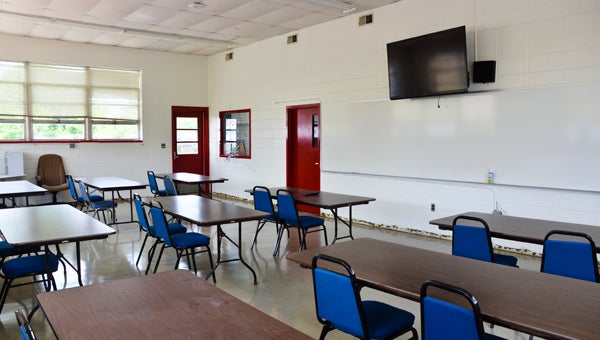Public Service Academy preparations nearly complete
Published 3:52 pm Wednesday, August 7, 2013

The former ESL room at LeCroy Career Technical Center was converted into a classroom for the fire fighting course in new the Public Service Academy program.
Preparations for the new Public Service Academy program at LeCroy Career Technical Center are almost complete.
Instructional facilities for the program’s two concentrations, fire fighting and law enforcement, are finished with the exception of signage for the outside of the buildings. State-provided curriculum and teaching materials will be delivered to campus in the next week.
The Public Service Academy is Chilton County’s first public service class available to high school students pursuing jobs in fire fighting, law enforcement or both after graduation.
The center’s former ESL building will serve as the fire instructional facility, while a doublewide trailer will house the law enforcement class.
Future plans for the program include building a state-of-the-art, fully operational fire training facility resembling a real fire station. The facility would be located on land behind the center.
“We’re just excited. We really feel like this will be a model program for the state,” LeCroy director Tommy Glasscock said. “We’re hoping to expand it. We’re hoping to have a state-of-the-art training facility for other entities to use as well.”
Glasscock said the two classes would have about 20 students each this fall.
Students who cannot start the program in the fall because of space constraints have the option of taking a business law class that coincides with the public service curriculum.
“We feel pretty certain we’re going to have a waiting list to get in based on the response we’ve gotten from schools,” Glasscock said Monday.
The Chilton County Board of Education approved at its July 16 meeting Deputy David Hubbard with the sheriff’s department and Clanton Fire Chief David Driver as credentialed instructors for the program.
Hubbard will be a full-time instructor for law enforcement, and Driver will be a part-time instructor for fire fighting along with other part-time certified instructors that will help Driver with fire training.
The sheriff’s department is lending a Humvee to the program, and other agencies have donated equipment, but Glasscock said more equipment or monetary donations to purchase equipment is needed.
For example, students in the fire fighting class will need access to all gear and equipment certified firefighters use on a daily basis.
“The real unique part of this program is the students will go through firefighter rituals,” Glasscock said. “It’s as lifelike as it’s going to be as a firefighter.”
The fire fighter class is available to 11th and 12th graders.
Students who complete the program will get the basic 160 course required to become volunteer firefighters and may then go to the Alabama Fire College for a five-week bridge course to become certified firefighters after high school.
The law enforcement class is available to 10th, 11th and 12th graders.
Students who start in law enforcement may also complete fire fighting through the program.
Part of the program will teach students how to identify safety issues at their schools, Glasscock said, adding that students will be responsible for manning a gated entrance to be added at the center eventually.
“We think that’s going to be a huge part (of) the school’s safety,” Glasscock said.
The Public Service Academy is a two-block class, which means it will require students to be at the center for two blocks (about 2.5 hours).
The class will be offered in a morning session and an afternoon session five days a week.
Tuition for law enforcement or fire fighting is $30 per year. No prerequisites are required.
For fire training, the first semester schedule will be: first block, Principles of Public Service – fire fighting; second block, Introduction to Fire Science; fourth block, Principles of Public Service – fire fighting; and fifth block, Introduction to Fire Science.
The second semester schedule will be: first block, Fire Fighting; second block, Emergency Services; fourth block, Fire Fighting; fifth block, Emergency Services.
For law enforcement, the first semester schedule will be: first block, Principles of Public Service – Law Enforcement; second block, Forensic and Criminal Investigations; fourth block, Principles of Public Service – Law Enforcement; and fifth block, Forensic and Criminal Investigations.
The second semester schedule will be: first block, Police Patrol; second block, Introduction to Law and the American Legal System; fourth block, Police Patrol; and fifth block, Introduction to Law and the American Legal System.
For more information or to donate to the program, call LeCroy Career Technical Center at (205) 280-2920.






